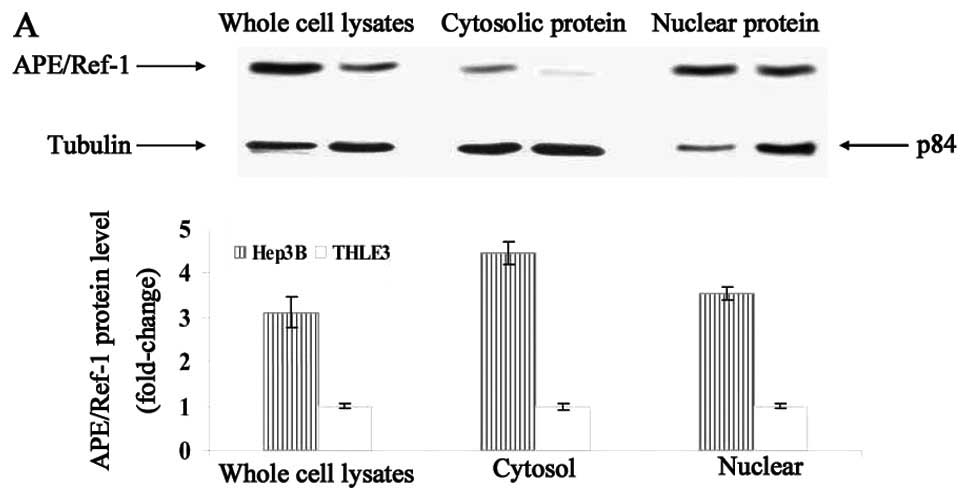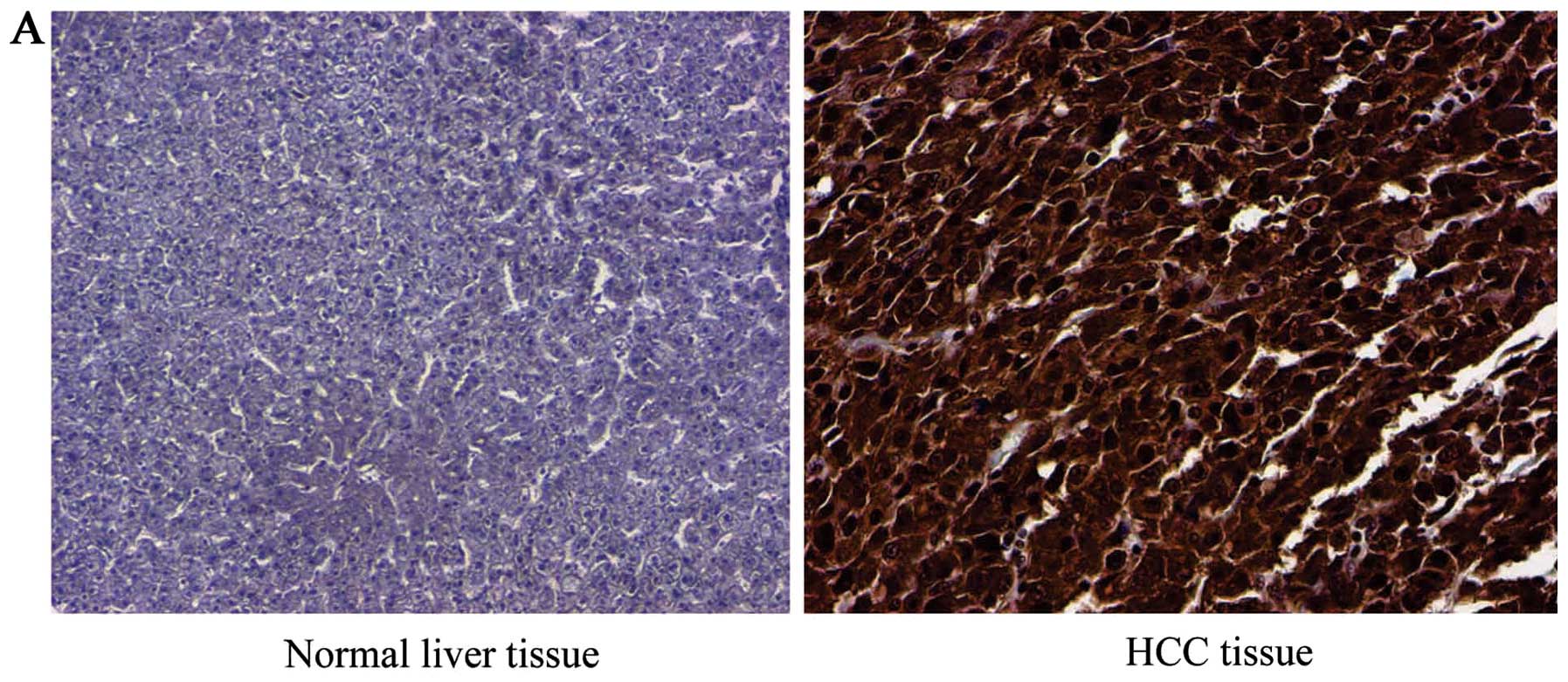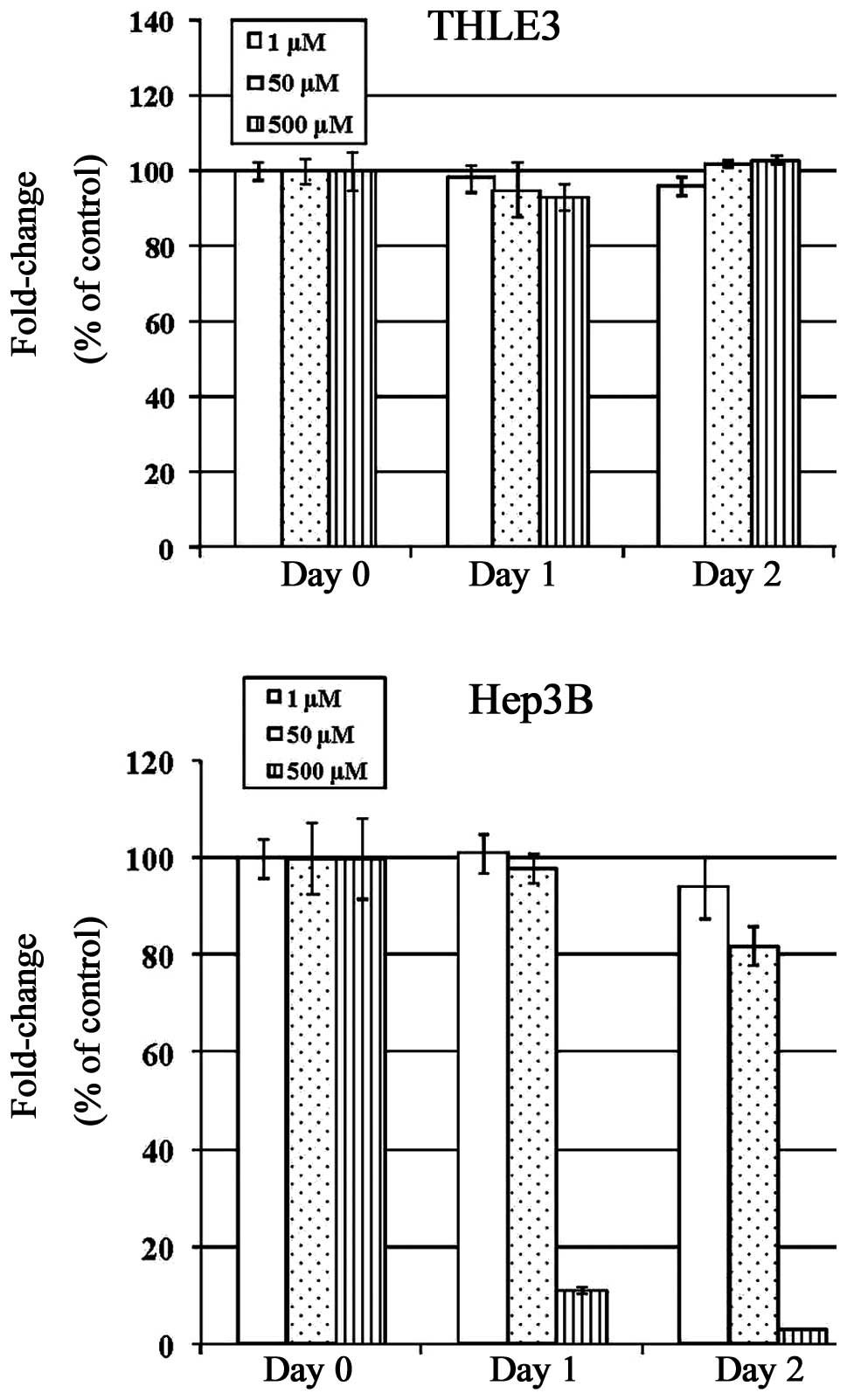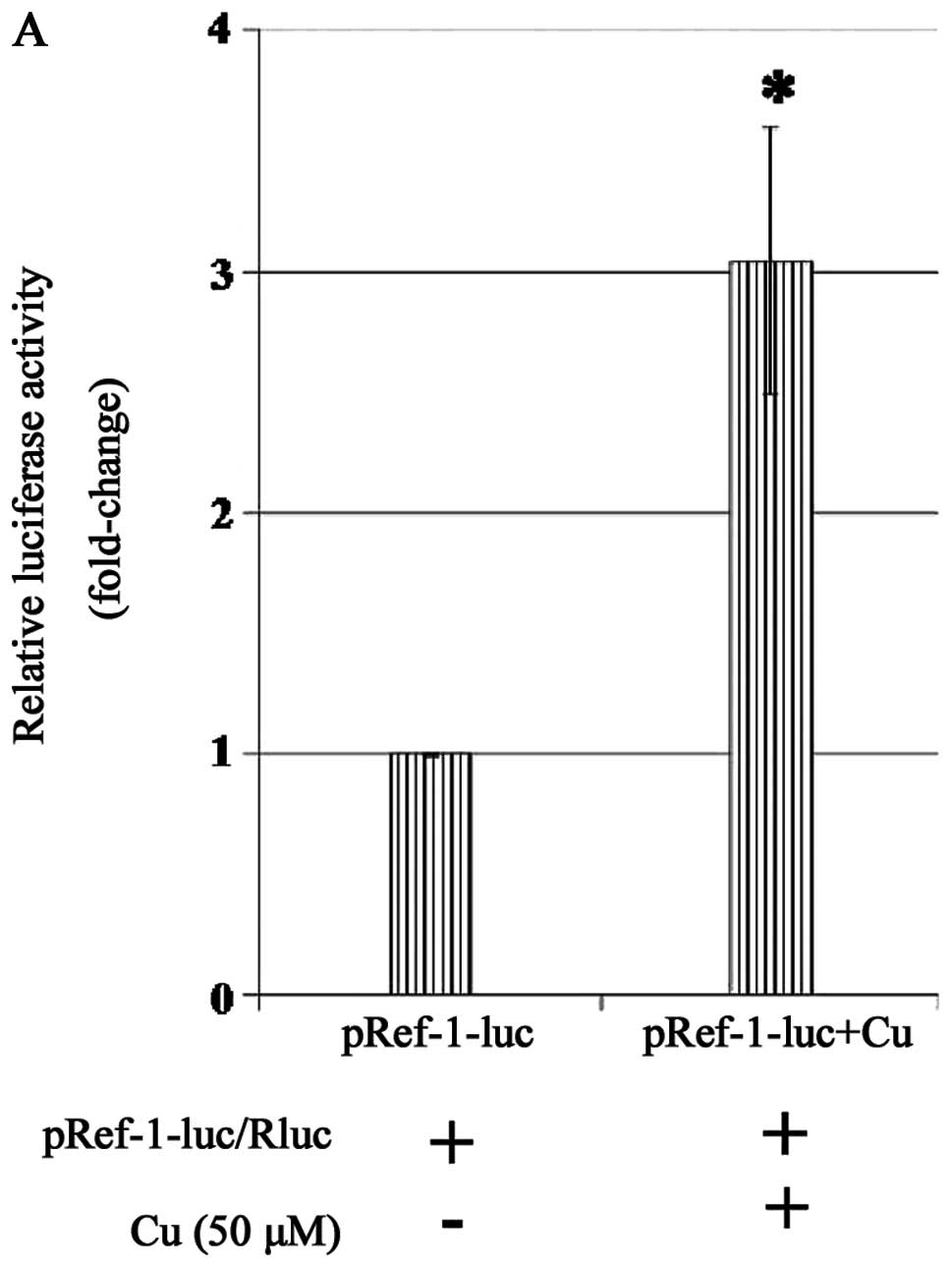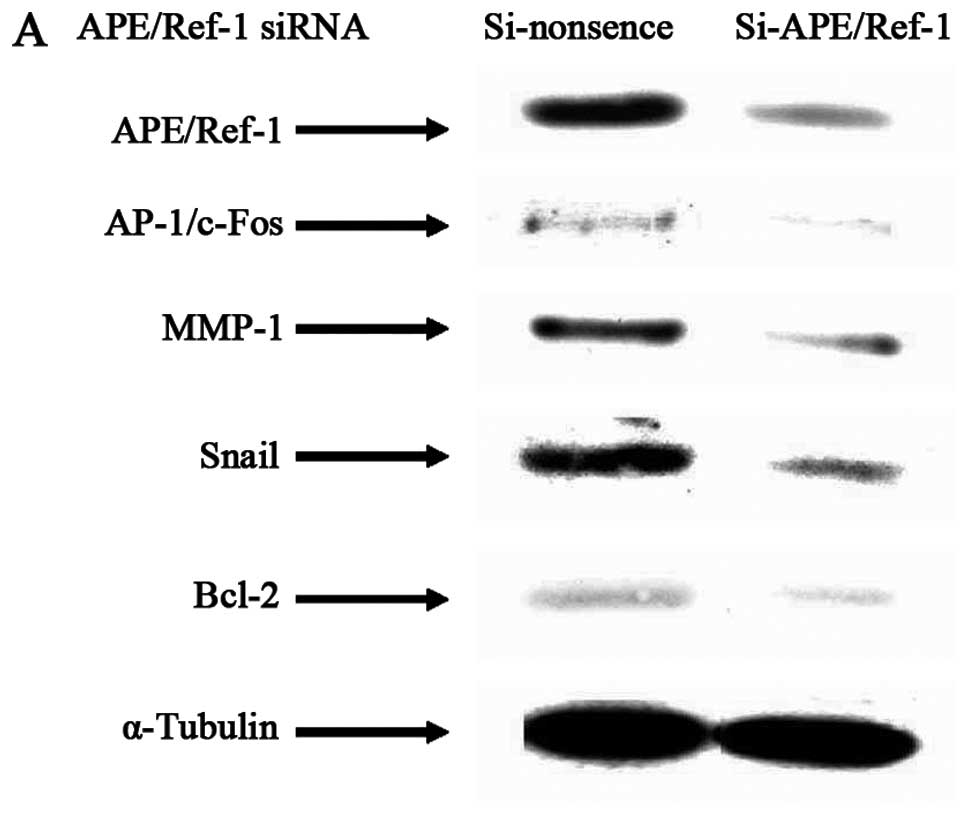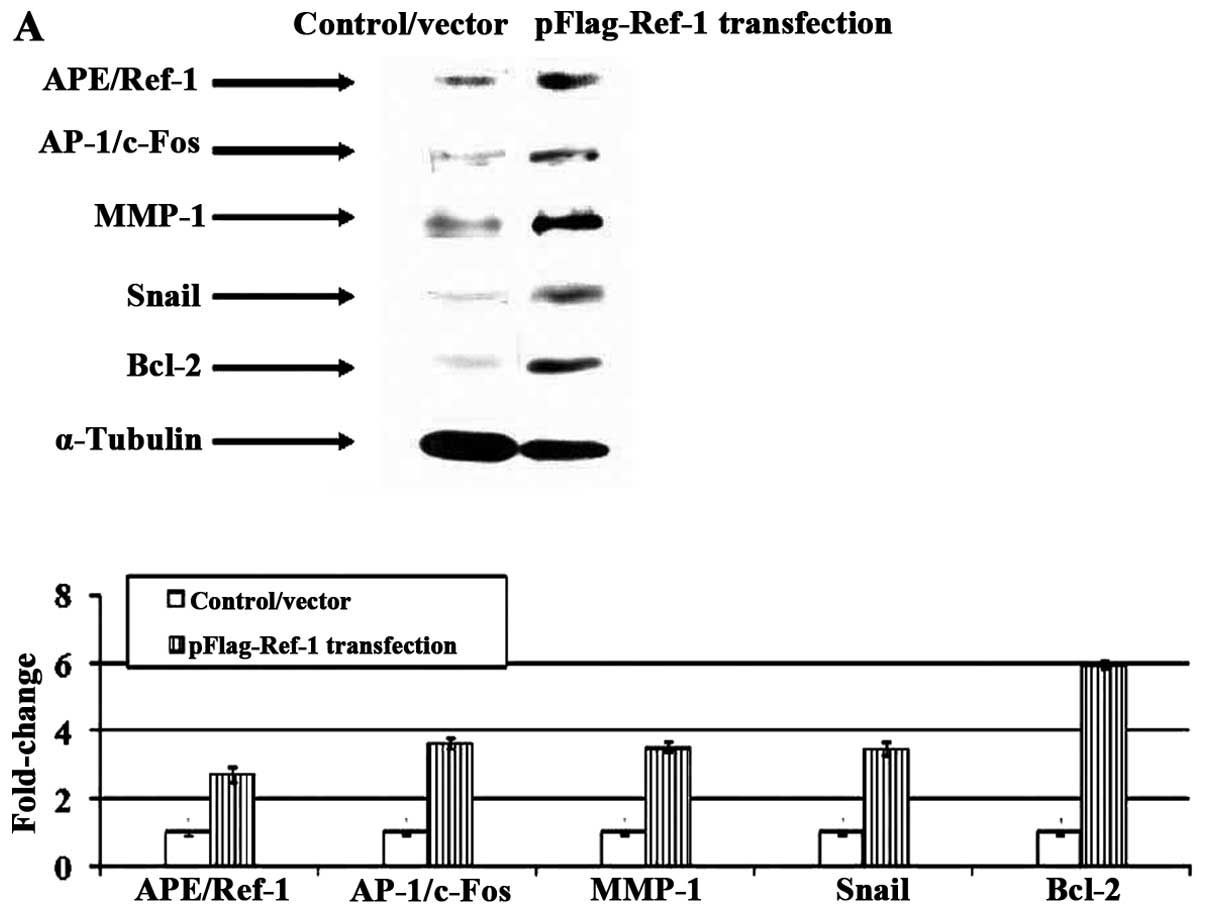|
1
|
Scaggiante B, Kazemi M, Pozzato G, et al:
Novel hepatocellular carcinoma molecules with prognostic and
therapeutic potentials. World J Gastroenterol. 20:1268–1288. 2014.
View Article : Google Scholar : PubMed/NCBI
|
|
2
|
Bruix J, Boix L, Sala M and Llovet JM:
Focus on hepatocellular carcinoma. Cancer Cell. 5:215–219. 2004.
View Article : Google Scholar
|
|
3
|
Tien Kuo M and Savaraj N: Roles of
reactive oxygen species in hepatocarcinogenesis and drug resistance
gene expression in liver cancers. Mol Carcinog. 45:701–709.
2006.PubMed/NCBI
|
|
4
|
Tell G, Quadrifoglio F, Tiribelli C and
Kelley MR: The many functions of APE1/Ref-1: not only a DNA repair
enzyme. Antioxid Redox Signal. 11:601–620. 2009. View Article : Google Scholar : PubMed/NCBI
|
|
5
|
Bobola MS, Blank A, Berger MS, Stevens BA
and Silber JR: Apurinic/apyrimidinic endonuclease activity is
elevated in human adult gliomas. Clin Cancer Res. 7:3510–3518.
2001.PubMed/NCBI
|
|
6
|
Kelley MR, Cheng L, Foster R, et al:
Elevated and altered expression of the multifunctional DNA base
excision repair and redox enzyme Ape1/ref-1 in prostate cancer.
Clin Cancer Res. 7:824–830. 2001.PubMed/NCBI
|
|
7
|
Moore DH, Michael H, Tritt R, Parsons SH
and Kelley MR: Alterations in the expression of the DNA
repair/redox enzyme APE/ref-1 in epithelial ovarian cancers. Clin
Cancer Res. 6:602–609. 2000.PubMed/NCBI
|
|
8
|
Russo D, Arturi F, Bulotta S, et al:
ApeI/Ref-I expression and cellular localization in human thyroid
carcinoma cell lines. J Endocrinol Invest. 24:10–12. 2001.
View Article : Google Scholar : PubMed/NCBI
|
|
9
|
Robertson KA, Bullock HA, Xu Y, et al:
Altered expression of Ape1/ref-1 in germ cell tumors and
overexpression in NT2 cells confers resistance to bleomycin and
radiation. Cancer Res. 61:2220–2225. 2001.PubMed/NCBI
|
|
10
|
Wang D, Luo M and Kelley MR: Human
apurinic endonuclease 1 (APE1) expression and prognostic
significance in osteosarcoma: enhanced sensitivity of osteosarcoma
to DNA damaging agents using silencing RNA APE1 expression
inhibition. Mol Cancer Ther. 3:679–686. 2004.
|
|
11
|
Puglisi F, Aprile G, Minisini AM, et al:
Prognostic significance of Ape1/ref-1 subcellular localization in
non-small cell lung carcinomas. Anticancer Res. 21:4041–4049.
2001.PubMed/NCBI
|
|
12
|
Kawanishi S, Hiraku Y, Murata M and Oikawa
S: The role of metals in site-specific DNA damage with reference to
carcinogenesis. Free Radic Biol Med. 32:822–832. 2002.PubMed/NCBI
|
|
13
|
Li Y, Togashi Y, Sato S, et al: Abnormal
copper accumulation in non-cancerous and cancerous liver tissues of
LEC rats developing hereditary hepatitis and spontaneous hepatoma.
Jpn J Cancer Res. 82:490–492. 1991. View Article : Google Scholar : PubMed/NCBI
|
|
14
|
Goodman VL, Brewer GJ and Merajver SD:
Copper deficiency as an anti-cancer strategy. Endocr Relat Cancer.
11:255–263. 2004. View Article : Google Scholar : PubMed/NCBI
|
|
15
|
Wu T, Sempos CT, Freudenheim JL, Muti P
and Smit E: Serum iron, copper and zinc concentrations and risk of
cancer mortality in US adults. Ann Epidemiol. 14:195–201. 2004.
View Article : Google Scholar : PubMed/NCBI
|
|
16
|
Kuo KW, Chen SF, Wu CC, Chen DR and Lee
JH: Serum and tissue trace elements in patients with breast cancer
in Taiwan. Biol Trace Elem Res. 89:1–11. 2002. View Article : Google Scholar : PubMed/NCBI
|
|
17
|
Zuo XL, Chen JM, Zhou X, Li XZ and Mei GY:
Levels of selenium, zinc, copper and antioxidant enzyme activity in
patients with leukemia. Biol Trace Elem Res. 114:41–53. 2006.
View Article : Google Scholar : PubMed/NCBI
|
|
18
|
Tashiro H, Kawamoto T, Okubo T and Koide
O: Variation in the distribution of trace elements in hepatoma.
Biol Trace Elem Res. 95:49–63. 2003. View Article : Google Scholar : PubMed/NCBI
|
|
19
|
Goodman VL, Brewer GJ and Merajver SD:
Control of copper status for cancer therapy. Curr Cancer Drug
Targets. 5:543–549. 2005. View Article : Google Scholar : PubMed/NCBI
|
|
20
|
Kontoghiorghes GJ, Efstathiou A,
Ioannou-Loucaides S and Kolnagou A: Chelators controlling metal
metabolism and toxicity pathways: applications in cancer
prevention, diagnosis and treatment. Hemoglobin. 32:217–227. 2008.
View Article : Google Scholar
|
|
21
|
Harrison L, Ascione AG, Wilson DM III and
Demple B: Characterization of the promoter region of the human
apurinic endonuclease gene (APE). J Biol Chem. 270:5556–5564. 1995.
View Article : Google Scholar : PubMed/NCBI
|
|
22
|
Yang S and Meyskens FL Jr: Alterations in
activating protein 1 composition correlate with phenotypic
differentiation changes induced by resveratrol in human melanoma.
Mol Pharmacol. 67:298–308. 2005. View Article : Google Scholar : PubMed/NCBI
|
|
23
|
Gupte A and Mumper RJ: Elevated copper and
oxidative stress in cancer cells as a target for cancer treatment.
Cancer Treat Rev. 35:32–46. 2009. View Article : Google Scholar : PubMed/NCBI
|
|
24
|
Valko M, Rhodes CJ, Moncol J, Izakovic M
and Mazur M: Free radicals, metals and antioxidants in oxidative
stress-induced cancer. Chem Biol Interact. 160:1–40. 2006.
View Article : Google Scholar : PubMed/NCBI
|
|
25
|
Evans AR, Limp-Foster M and Kelley MR:
Going APE over APE/Ref-1. Mutat Res. 461:83–108. 2001. View Article : Google Scholar
|
|
26
|
Merdad A, Karim S, Schulten HJ, et al:
Expression of matrix metalloproteinases (MMPs) in primary human
breast cancer: MMP-9 as a potential biomarker for cancer invasion
and metastasis. Anticancer Res. 34:1355–1366. 2014.PubMed/NCBI
|
|
27
|
Ma H, Cai H, Zhang Y, et al: Membrane
palmitoylated protein 3 promotes hepatocellular carcinoma cell
migration and invasion via up-regulating matrix metalloproteinase
1. Cancer Lett. 344:74–81. 2014. View Article : Google Scholar : PubMed/NCBI
|
|
28
|
Dey S, Ghosh N, Saha D, Kesh K, Gupta A
and Swarnakar S: Matrix metalloproteinase-1 (MMP-1) promoter
polymorphisms are well linked with lower stomach tumor formation in
eastern Indian population. PLoS One. 9:e880402014. View Article : Google Scholar : PubMed/NCBI
|
|
29
|
Teshima J, Doi H, Fujimori K, et al: A
human thyroid cancer cell line, DH-14–3, newly established from
poorly differentiated thyroid carcinoma. Tohoku J Exp Med.
230:75–82. 2014.PubMed/NCBI
|
|
30
|
Angel P, Baumann I, Stein B, Delius H,
Rahmsdorf HJ and Herrlich P: 12-O-tetradecanoyl-phorbol-13-acetate
induction of the human collagenase gene is mediated by an inducible
enhancer element located in the 5′-flanking region. Mol Cell Biol.
7:2256–2266. 1987.PubMed/NCBI
|
|
31
|
Gutman A and Wasylyk B: The collagenase
gene promoter contains a TPA and oncogene-responsive unit
encompassing the PEA3 and AP-1 binding sites. EMBO J. 9:2241–2246.
1990.PubMed/NCBI
|
|
32
|
Butticè G, Duterque-Coquillaud M, Basuyaux
JP, Carrère S, Kurkinen M and Stéhelin D: Erg, an Ets-family
member, differentially regulates human collagenase1 (MMP1) and
stromelysin1 (MMP3) gene expression by physically interacting with
the Fos/Jun complex. Oncogene. 13:2297–2306. 1996.
|
|
33
|
Bendardaf R, Buhmeida A, Ristamäki R,
Syrjänen K and Pyrhönen S: MMP-1 (collagenase-1) expression in
primary colorectal cancer and its metastases. Scand J
Gastroenterol. 42:1473–1478. 2007. View Article : Google Scholar : PubMed/NCBI
|
|
34
|
Miyoshi A, Kitajima Y, Sumi K, et al:
Snail and SIP1 increase cancer invasion by upregulating MMP family
in hepatocellular carcinoma cells. Br J Cancer. 90:1265–1273. 2004.
View Article : Google Scholar : PubMed/NCBI
|
|
35
|
Cano A, Perez-Moreno MA, Rodrigo I, et al:
The transcription factor Snail controls epithelial-mesenchymal
transitions by repressing E-cadherin expression. Nat Cell Biol.
2:76–83. 2000. View
Article : Google Scholar : PubMed/NCBI
|
|
36
|
Miyoshi A, Kitajima Y, Kido S, et al:
Snail accelerates cancer invasion by upregulating MMP expression
and is associated with poor prognosis of hepatocellular carcinoma.
Br J Cancer. 92:252–258. 2005.PubMed/NCBI
|
|
37
|
Czabotar PE, Lessene G, Strasser A and
Adams JM: Control of apoptosis by the BCL-2 protein family:
implications for physiology and therapy. Nat Rev Mol Cell Biol.
15:49–63. 2014. View
Article : Google Scholar : PubMed/NCBI
|
|
38
|
Han CR, Jun do Y, Lee JY and Kim YH:
Prometaphase arrest-dependent phosphorylation of Bcl-2 and Bim
reduces the association of Bcl-2 with Bak or Bim, provoking Bak
activation and mitochondrial apoptosis in nocodazole-treated Jurkat
T cells. Apoptosis. 19:224–240. 2014. View Article : Google Scholar : PubMed/NCBI
|
|
39
|
Cao W, Zhang JL, Feng DY, et al: The
effect of adenovirus-conjugated NDRG2 on p53-mediated apoptosis of
hepatocarcinoma cells through attenuation of nucleotide excision
repair capacity. Biomaterials. 35:993–1003. 2014. View Article : Google Scholar : PubMed/NCBI
|
|
40
|
Yang CF, Peng LX, Huang TJ, et al: Cancer
stem-like cell characteristics induced by EB virus-encoded LMP1
contribute to radioresistance in nasopharyngeal carcinoma by
suppressing the p53-mediated apoptosis pathway. Cancer Lett.
344:260–271. 2014. View Article : Google Scholar
|















